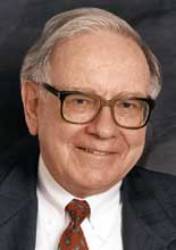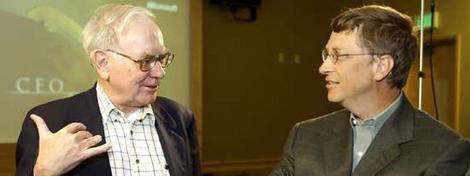|
|

|
![The Warren Buffett Way [2nd Edition]](../image/ArticleImages/Warren4.jpg)
|
|
Warren
Buffett, The Stock Market Guru
|
A
book on the living legend authored by Robert Hagstrom (2004)
|
|

|
|
Warren
Buffett, regarded as the second wealthiest man on Earth with Bill
Gates, the wealthiest man on Earth
|
Warm
and fuzzy aren't words normally used to describe captains of industry.
That is unless you're talking about Warren Buffett –The Making of an
American Capitalist. He's the second-richest man on the planet, the best
investor ever.
He
was born in Nebraska, Omaha, USA on the 30th of August in 1930. He was
born to Leila and Howard Buffett and was the second of three children, he
being the only boy. His father, Howard was a stockbroker and also became a
member of the Congress. He began his study at the Wharton School of
Finance at the University of Pennsylvania, but shifted to the University
of Nebraska where he graduated. He then went on to Columbia University to
do his Masters in economics.
He
showed early signs of being entrepreneurial by being involved in various
business dealings as a child, including purchasing bottles of cola cheaply
and selling them for a profit. As a boy, irrespective of his family
background, he delivered newspapers to make extra money and this probably
sparked his interest in the media where he has made several successful
investments including the Washington Post Company, a stock that has made
him a lot of money and which he vows never to sell.
At
the age of 11 years when we people think of games and fun he made his
first investment and this was his first move in the stock market. At the
University of Columbia he met the influential value investor Benjamin
Graham. He was very influenced by Benjamin Graham. He tried to get a
position with Graham’s firm and was at first unsuccessful. But he never
lost hope and made an effort to enter into the firm and he succeeded in
it. After entering in Graham-Newman he developed many of his stock market
investing skills that have now become legendary.
He
returned to Omaha and began a limited investing fund partnership with a
group of friends, family and associates. The "Buffett Partnerships
Ltd" fund racked up amazing returns for its investors over a ten year
period, with returns 10 times higher than the Dow Jones Industrial average
for the same time.
Buffett,
after several years, decided to wind up the partnership, returning the
lucky investors their capital and their share of the profits, and bought a
stake in Berkshire Hathaway - a textile company. His early days at
Berkshire Hathaway were not great. The company was in an industry facing
real challenges from exports and high manufacturing costs. He had not,
however, forgotten what he had learned under Graham, and arranged for the
company to buy out two Nebraska insurance companies.
This
was the start of his interest in insurance and the rise to financial fame
of both himself and Berkshire Hathaway. The insurance game is a hard one
but under him, the company had become not only a successful share
investor, but a leading provider of insurance. The insurance industry was
the first major area of success that Berkshire Hathaway had, with the
funds used to acquire carefully selected investments each year. Major
undervalued companies that he took advantage of included "American
Express", "Coca-Cola" "The Washington Post" and
"Gillette". Berkshire Hathaway owns large holdings of each of
the above major brand companies (more than 5% each).
Management
style
Buffett
views himself as a capital allocator above anything else. His primary
responsibility is to allocate capital to businesses with good economics
and keep their existing management to lead the company. When he acquired a
controlling interest in a business, he made clear to the owner the
following:
-
He
will not interfere with the running of the company.
-
He
will be responsible for hiring and setting the compensation of the top
executive.
-
His
hands-off approach has held strong appeal and created room for his
managers to perform as owners and ultimate decision makers of their
businesses. This acquisition strategy enabled him to buy companies at
fair prices because the sellers wanted room to operate independently
after selling.
Besides
his skills in managing Berkshire's cash flow, he is skilled in managing
the company's balance sheet. Since taking over Berkshire Hathaway, he has
weighed every decision against its impact on the balance sheet. He has
succeeded in building Berkshire into one of the eight companies (as
of 2005) that are still rated by Moody's as AAA, the highest credit rating achievable and
thus with the lowest cost of debt.
Investment
Approach:
Buffett
was of the belief that as long as the market undervalued the stocks
relative to their intrinsic value he was making a solid investment. He
reasoned that the market will eventually realize it has undervalued the
company and will correct its course regardless of what type of business
the company was in. In addition he believes that the business has to have
solid economics behind it. He does not hurry to invest in businesses with
indiscernible value. He will wait for market corrections or downturns to
buy solid businesses at reasonable prices, since stock-market downturns
present buying opportunities.
Buffett
is known for being conservative when speculation is rampant in the market
and being aggressive when others fear for their capital. This contrarian
strategy is what led Buffett's company through the Internet boom and bust
without significant damage, although critics have also noted that it may
have led Berkshire to miss out on potential opportunities during the same
period.
Warren
Buffett's Five Secrets of Success:
-
Know
your strengths and weaknesses; admit your likes and dislikes.
-
Don't
take yourself too seriously. But take what you do—especially for
your stakeholders—very seriously.
-
Treat
money as a tool, not a ticket to immortality.
-
Focus
on the fundamentals. Practice them with the ruthless discipline of a
master.
-
Make
friends with the media. Dance to their tune and let them crown you
belle of the ball.
Social
Responsibility:
He is a generous
philanthropist and was giving more than $USD12 million each year to the Buffett
Foundation (now called the "Susan Thompson Buffett Foundation").
His largest charitable donation was to be upon his death when he had
planned to give 99% of his massive fortune to the foundation. In June
2006, he announced plans to give much of his wealth away while he
is still living. The majority of the Buffett billions will go to the
foundation of his Bridge partner and friend of fifteen years, Bills Gates
and his Bill & Melinda Gates Foundation.
So
this is Warren Buffett who inspires all of us to dream higher and to work
hard to achieve them.
We
end this very short write up on Warren Buffett by quoting some of his
immortal lines as follows, “You
only have to do a very few things right in your life so long as you don't
do too many things wrong.”
References:
-
http://www.frugalmarketing.com/dtb/warren-buffett.shtml
-
http://en.wikipedia.org/wiki/Warren_Buffett#References
-
Lowe,
Janet C. [1997] Warren Buffett Speaks : wit and wisdom from
the world's greatest investor, John Wiley & Sons, Inc., pp.
164-166 (ISBN 0-471-16996-X).
-
Warren
Buffett Talks Business,
The University of North Carolina Center for Public Television, Chapel
Hill, 1995 (modified later by Buffett letter to author), p. 192.
-
Warren
Buffett - The Pragmatist,
Esquire, June 1988, p. 159.
|